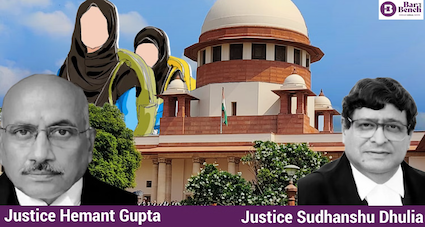A two-judge bench of the Supreme Court has delivered a split judgment while hearing petitions challenging the Karnataka High Court order which refused to overturn a ban on hijabs in educational institutions in the state.
But there is no stay by the top court on the Karnataka High court verdict.
The matter has now been referred to the Chief Justice of India (CJI) UU Lalit to constitute a fresh bench.The new bench will have three or more judges as per the CJI’s discretion.
So, as of date, the government notification stands, and the Karnataka government need not change any norms in schools.
While Justice Hemant Gupta observed that the ambit and scope of the right to freedom of religion had to be discussed, Justice Himanshu Dhulia said wearing a hijab was a matter of choice.
During the hearing, Justice Hemant Gupta stressed the need to discuss the ambit and scope of the right to freedom of religion.
Justice Gupta said, “I have framed 11 questions for consideration.” This means, the CJI while constituting the larger bench, will have to consider all 11 issues and then decide upon the composition of the bench.
Justice Hemant Gupta proposed to dismiss the appeal and uphold the ban on hijab in educational institutions.
Justice Sudhanshu Dhulia said wearing a hijab was a matter of choice. He stressed the importance of girls’ education, especially in rural areas.
Justice Sudhanshu Dhulia set aside the Karnataka High Court judgment and held that the entire concept of essential religious practice was not essential to the dispute.
“The High Court took a wrong path. It is ultimately a matter of choice and Articles 14 and 19. It is a matter of choice, nothing more and nothing less,” Justice Dhulia said.
Justice Dhulia said that the foremost question on his mind was the education of the girl child and said, “Are we making her life any better? That was a question in my mind. I have quashed the Government Order of February 5 and have held that the judgment in Bijoe Emmanuel squarely covers the issue.”
The students had come in an appeal against a Karnataka High Court judgment which had held that the proscription on hijab in classrooms was a reasonable restriction and had said that hijab was not an essential religious practice in Islam.
During the 10 days of arguments, petitioners argued on the issue of comparison with Sikh practices, the test of essentiality, the right to dress, and the right to education. While the state justified the ban by saying that it is religion-neutral and was the need of the time.


